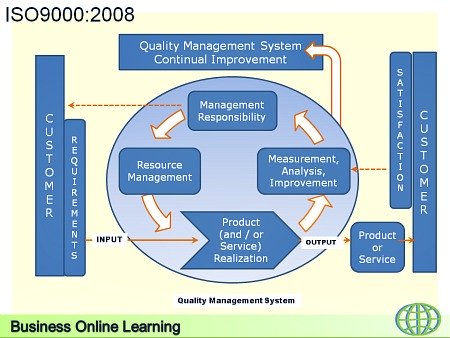What Is ISO9000
-
Top Ten Myths
There are many popular misconceptions about What is ISO9000 and the certification process.
Myth-busting What Is ISO9000
1. Having a Certificate showing your ISO9000 certification will guarantee customers
No, having a certificate that shows that your Quality Management System is certified to the standard, only means that your Quality System has a structured and tested approach according to the Principles and Requirements set out in the ISO9000 standard.
2. Being certified according to ISO9000 means you have a top quality product.
No, The certificate is given to companies that have a system in place. As the Certifying process doesn’t look at the results of the system, it can make no qualified statement as to the quality of the product from the service or the production. In fact, it is illegal to advertise that the product has been certified to ISO9000 and can lead to the withdrawal of the hard-won certificate.
3. The Responsibility for the certification lies with the Quality Guys.
As Quality is all about the meeting of requirements, every section in a company has the responsibility to ensure that the quality of their work contributes to the company’s overall success.
4. The Quality Department police the rest of the company.
No, the Quality department are not there to act as police. They should be the facilitators, supporters, trainers and enablers of achieving an understanding within the company “what is ISO9000”.
5. Top Management allow the Quality Department to comply to what is ISO9000
Top Management have a key role in the success of the Quality management System. At regular intervals they are to receive data on the running of the system and react accordingly. Top management have the responsibility for the Quality Policy in the company and the degree to which Quality is taken seriously.
6. “What is ISO9000 but a money racket?”
Certainly, the work needed to be done in order to be certified will be expensive. On the other hand, not having a good Quality Management System in place is far more likely to be more expensive, alone through loss of customers, internal waste, waste of Man-power, etc.
7. Any Certifying Body or Agency will do in the certification process.
This is a mistake made by many. It is however becoming the norm to only work with agencies that are accredited. These are agencies that are themselves audited and assessed by governing bodies to ensure that all awards given are done according to auditing standards. Certificates awarded by non-accredited agencies are hardly worth the paper they are written on.
8. “What is ISO9000 but a waste of time?”
We have already mentioned the losses incurred when there is no Quality management System in place. Here we view the attitude that occurs in the preparation phase for the certification process. Starting out, there is often so much to do – it is a huge project. But done efficiently, the company will be amazed at the advances that will be enabled with the new transparency that will exist. On top of that, much time will be saved by people not having to re-invent the wheel as processes will be documented, showing exactly how a job is to be done.
9. Hire External Consultants to get the Certificate.
This is a quick-fix approach that mostly fails. Certainly there are good consultants out there that will leave with a fully integrated system in place, but this is unfortunately not always the case. Far too often the material left behind is unclear, the ownership for the documents hasn’t been clarified and the resulting problems will just surmount until the certificate process has been nothing else but a farce.
10. All Documentation must be written using the titles from the standard.
Absolutely not! The development of the Quality Management System is an internal system for the employees. Its aim is to make it clear how Quality can be reached and maintained in all areas of the organisation. So, it must be written in company internal language and common terms. As this will not enlighten the burden for the Certifying Auditor who has to understand the system in order to certify it, it is advisable to have a company- internal expert who can act as a “Translator” for the auditors. This person will have the responsibility to ensure that the Auditors see how the requirements from the standard are being met – just not in the exact wording from the standard.
Go To Top of What Is ISO9000 Page













 My name is Martha and I have worked for over 30 years in various aspects of business and in various countries, right around the world.
My name is Martha and I have worked for over 30 years in various aspects of business and in various countries, right around the world.